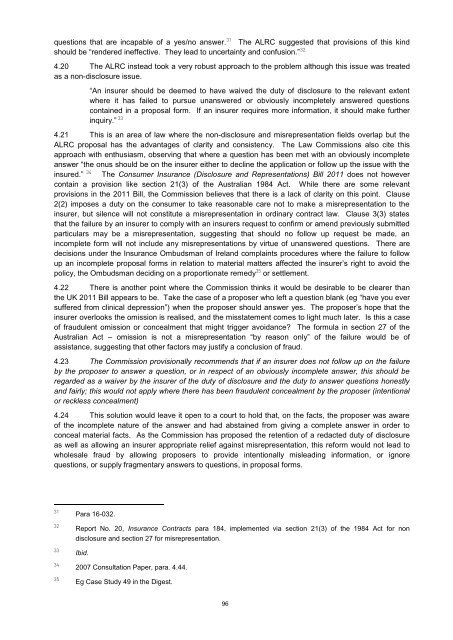Insurance Contracts CP - Law Reform Commission
Insurance Contracts CP - Law Reform Commission
Insurance Contracts CP - Law Reform Commission
You also want an ePaper? Increase the reach of your titles
YUMPU automatically turns print PDFs into web optimized ePapers that Google loves.
questions that are incapable of a yes/no answer. 31 The ALRC suggested that provisions of this kind<br />
should be ―rendered ineffective. They lead to uncertainty and confusion.‖ 32<br />
4.20 The ALRC instead took a very robust approach to the problem although this issue was treated<br />
as a non-disclosure issue.<br />
―An insurer should be deemed to have waived the duty of disclosure to the relevant extent<br />
where it has failed to pursue unanswered or obviously incompletely answered questions<br />
contained in a proposal form. If an insurer requires more information, it should make further<br />
inquiry.‖ 33<br />
4.21 This is an area of law where the non-disclosure and misrepresentation fields overlap but the<br />
ALRC proposal has the advantages of clarity and consistency. The <strong>Law</strong> <strong>Commission</strong>s also cite this<br />
approach with enthusiasm, observing that where a question has been met with an obviously incomplete<br />
answer ―the onus should be on the insurer either to decline the application or follow up the issue with the<br />
insured.‖ 34 The Consumer <strong>Insurance</strong> (Disclosure and Representations) Bill 2011 does not however<br />
contain a provision like section 21(3) of the Australian 1984 Act. While there are some relevant<br />
provisions in the 2011 Bill, the <strong>Commission</strong> believes that there is a lack of clarity on this point. Clause<br />
2(2) imposes a duty on the consumer to take reasonable care not to make a misrepresentation to the<br />
insurer, but silence will not constitute a misrepresentation in ordinary contract law. Clause 3(3) states<br />
that the failure by an insurer to comply with an insurers request to confirm or amend previously submitted<br />
particulars may be a misrepresentation, suggesting that should no follow up request be made, an<br />
incomplete form will not include any misrepresentations by virtue of unanswered questions. There are<br />
decisions under the <strong>Insurance</strong> Ombudsman of Ireland complaints procedures where the failure to follow<br />
up an incomplete proposal forms in relation to material matters affected the insurer‘s right to avoid the<br />
policy, the Ombudsman deciding on a proportionate remedy 35 or settlement.<br />
4.22 There is another point where the <strong>Commission</strong> thinks it would be desirable to be clearer than<br />
the UK 2011 Bill appears to be. Take the case of a proposer who left a question blank (eg ―have you ever<br />
suffered from clinical depression‖) when the proposer should answer yes. The proposer‘s hope that the<br />
insurer overlooks the omission is realised, and the misstatement comes to light much later. Is this a case<br />
of fraudulent omission or concealment that might trigger avoidance? The formula in section 27 of the<br />
Australian Act – omission is not a misrepresentation ―by reason only‖ of the failure would be of<br />
assistance, suggesting that other factors may justify a conclusion of fraud.<br />
4.23 The <strong>Commission</strong> provisionally recommends that if an insurer does not follow up on the failure<br />
by the proposer to answer a question, or in respect of an obviously incomplete answer, this should be<br />
regarded as a waiver by the insurer of the duty of disclosure and the duty to answer questions honestly<br />
and fairly; this would not apply where there has been fraudulent concealment by the proposer (intentional<br />
or reckless concealment)<br />
4.24 This solution would leave it open to a court to hold that, on the facts, the proposer was aware<br />
of the incomplete nature of the answer and had abstained from giving a complete answer in order to<br />
conceal material facts. As the <strong>Commission</strong> has proposed the retention of a redacted duty of disclosure<br />
as well as allowing an insurer appropriate relief against misrepresentation, this reform would not lead to<br />
wholesale fraud by allowing proposers to provide intentionally misleading information, or ignore<br />
questions, or supply fragmentary answers to questions, in proposal forms.<br />
31<br />
32<br />
33<br />
34<br />
35<br />
Para 16-032.<br />
Report No. 20, <strong>Insurance</strong> <strong>Contracts</strong> para 184, implemented via section 21(3) of the 1984 Act for non<br />
disclosure and section 27 for misrepresentation.<br />
Ibid.<br />
2007 Consultation Paper, para. 4.44.<br />
Eg Case Study 49 in the Digest.<br />
96

















